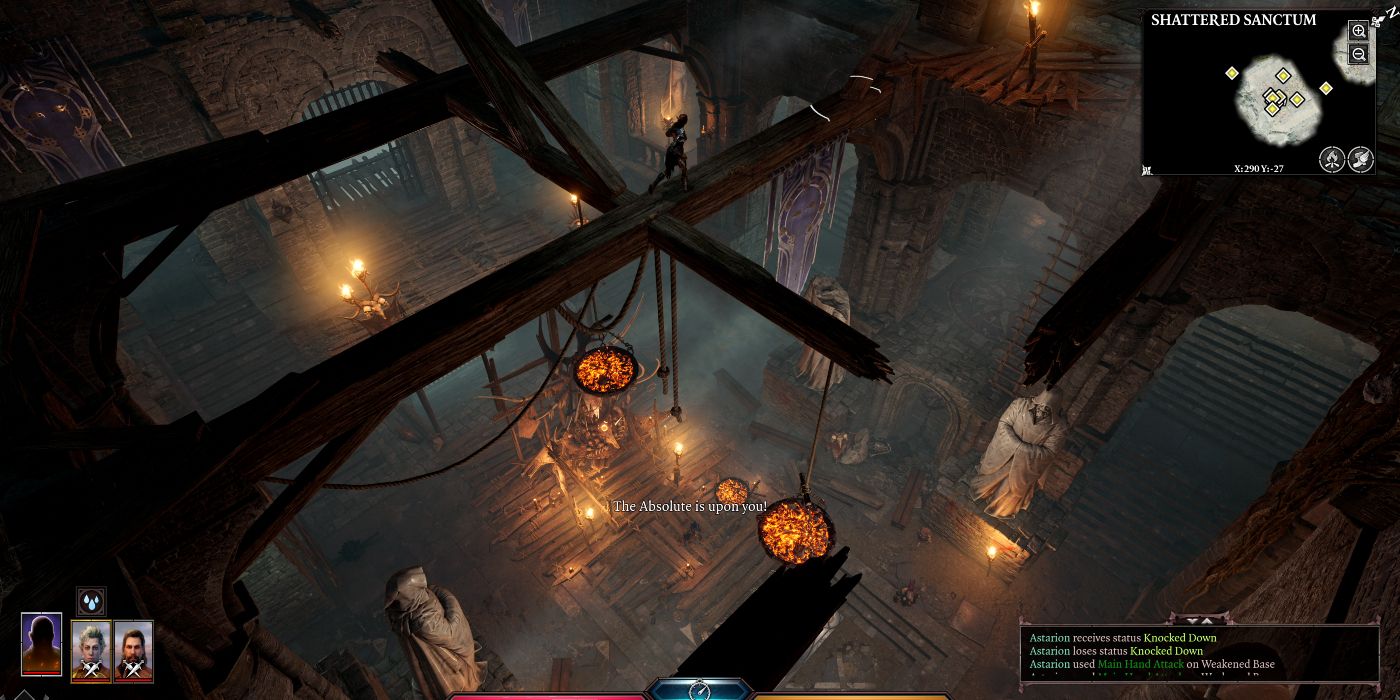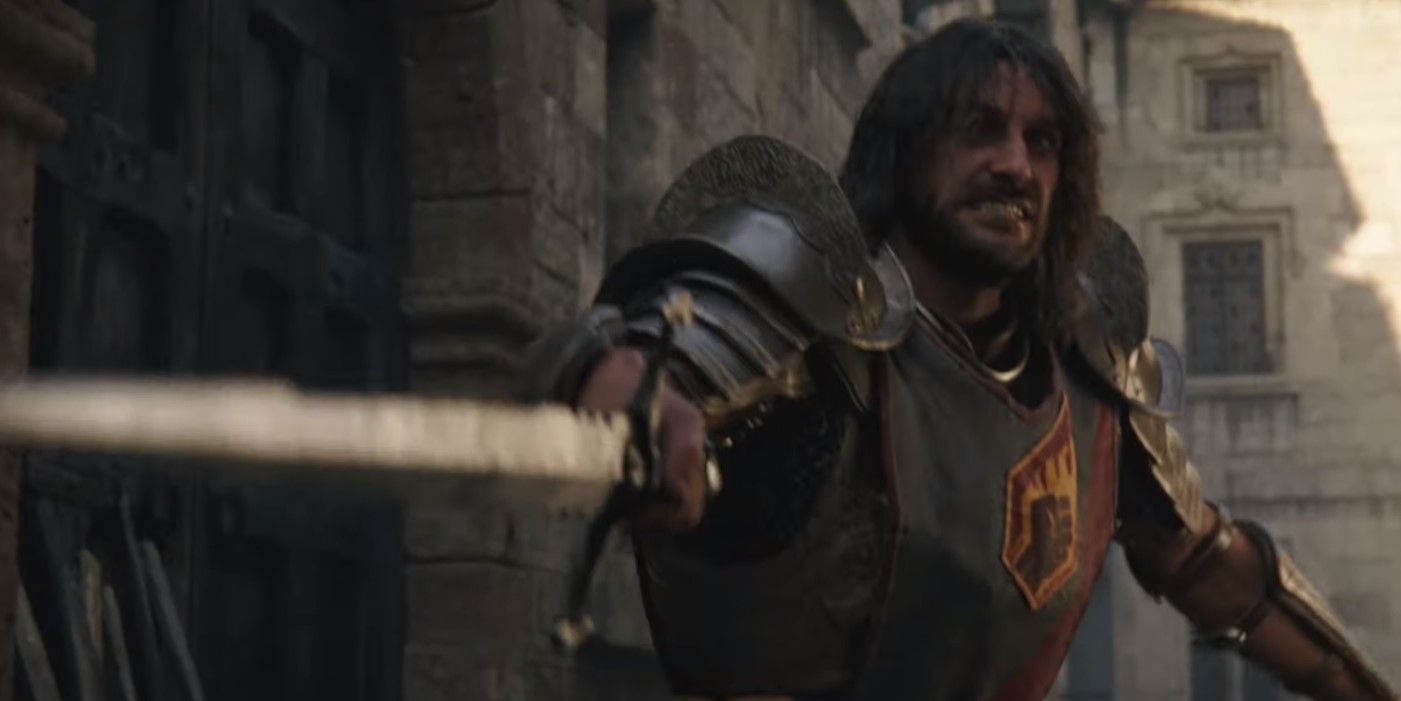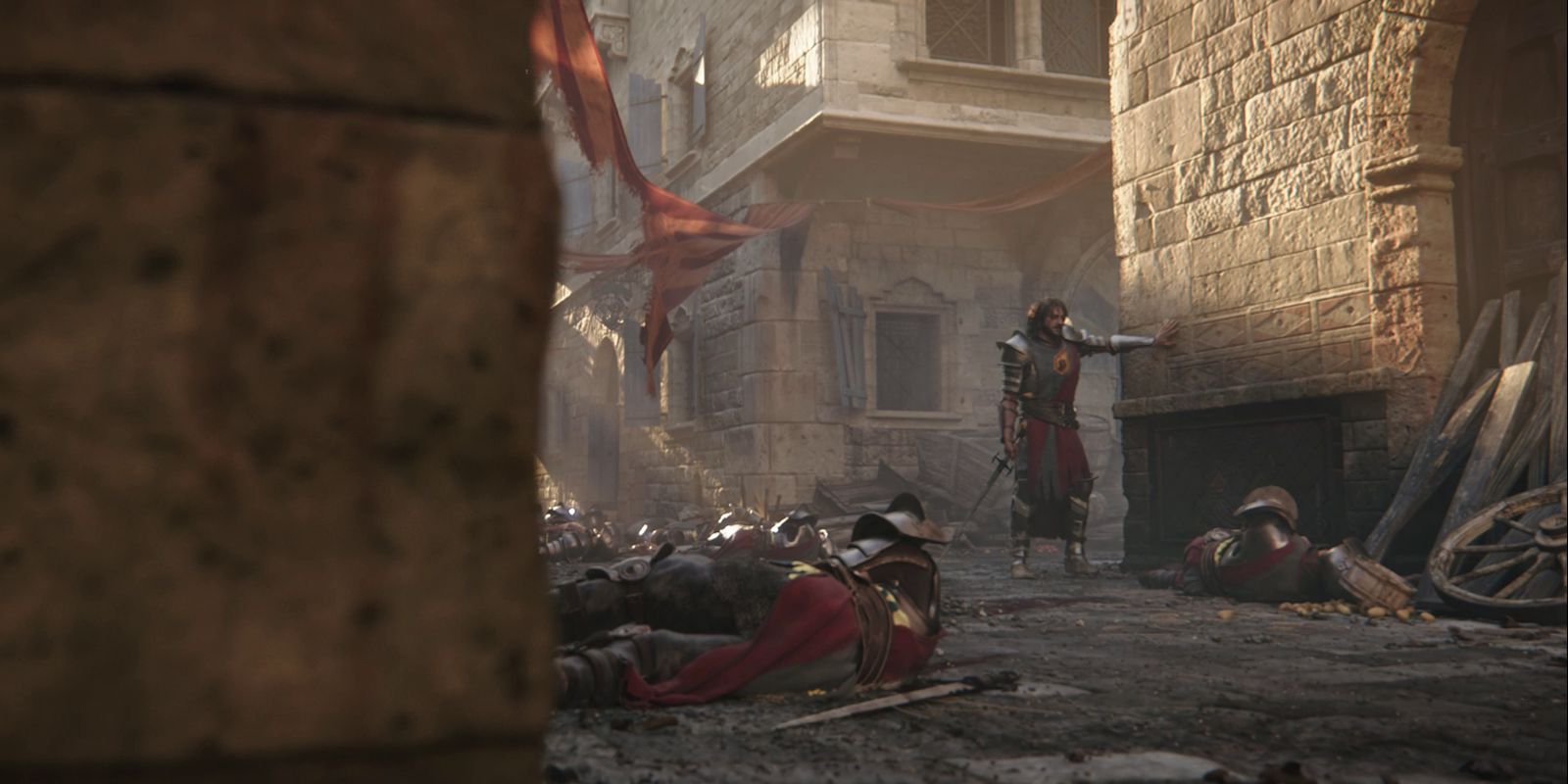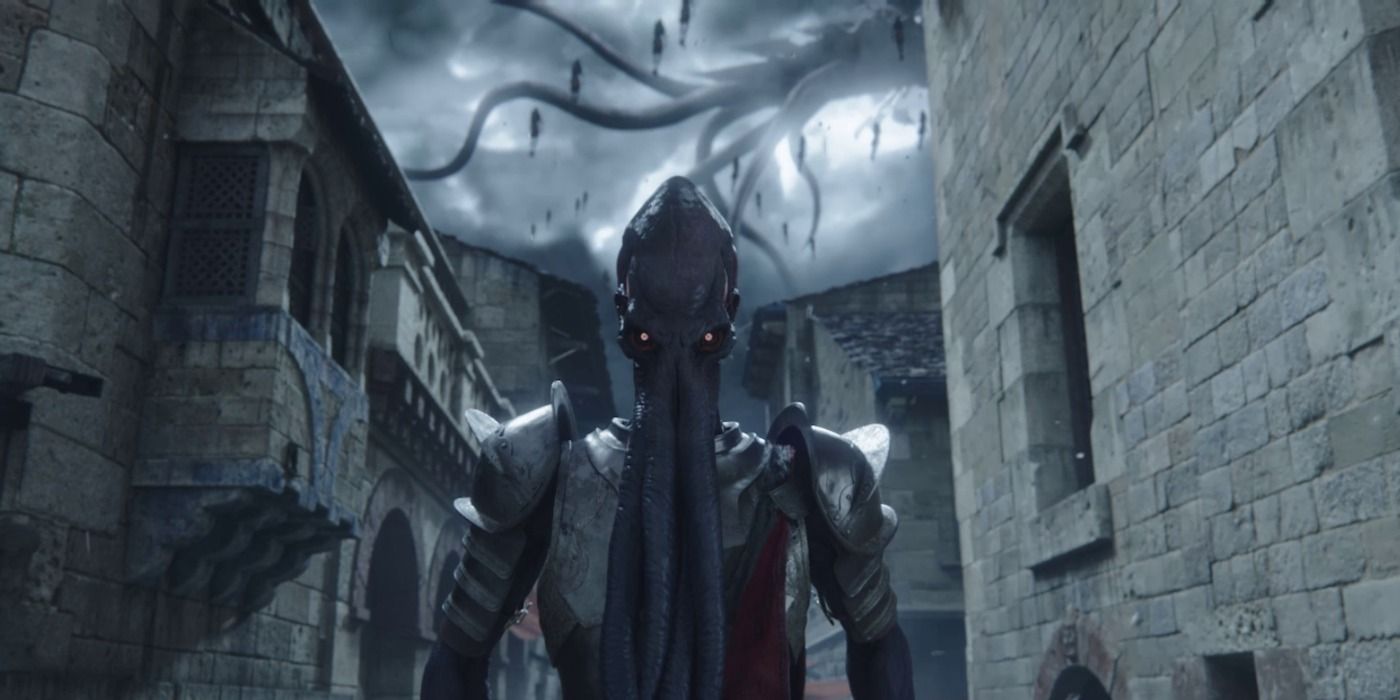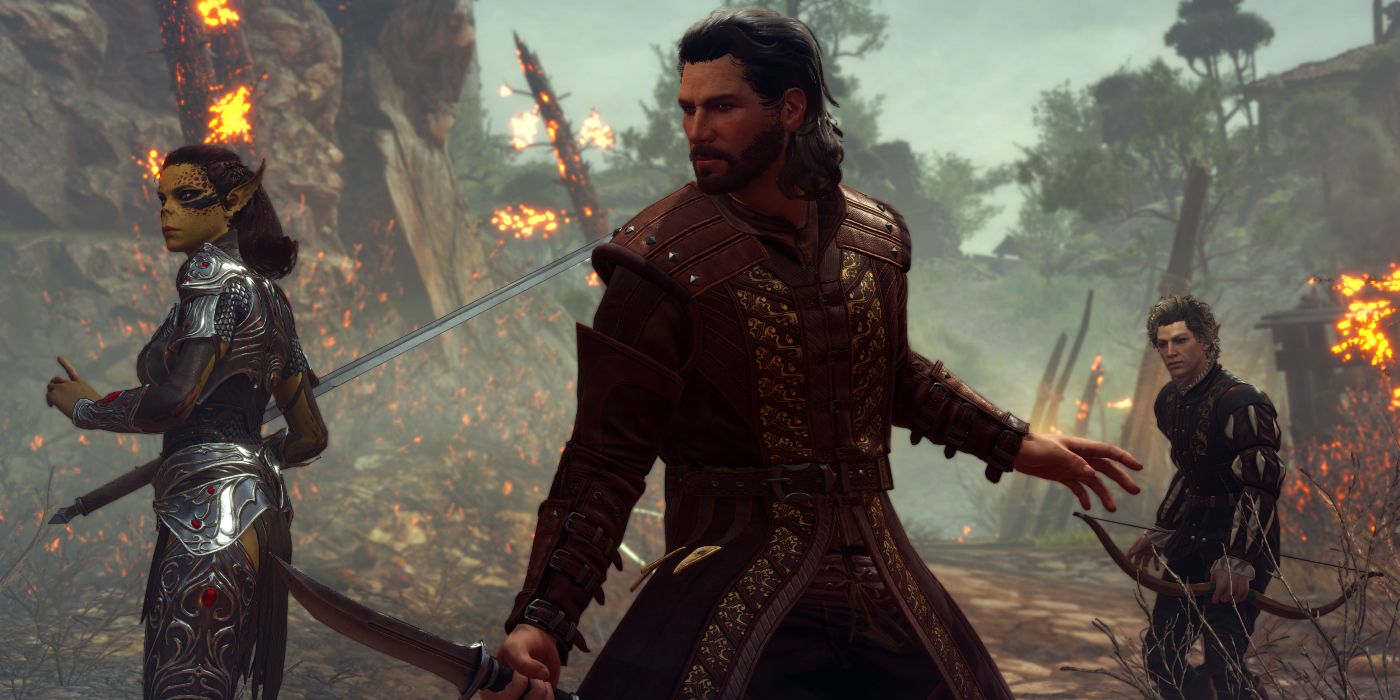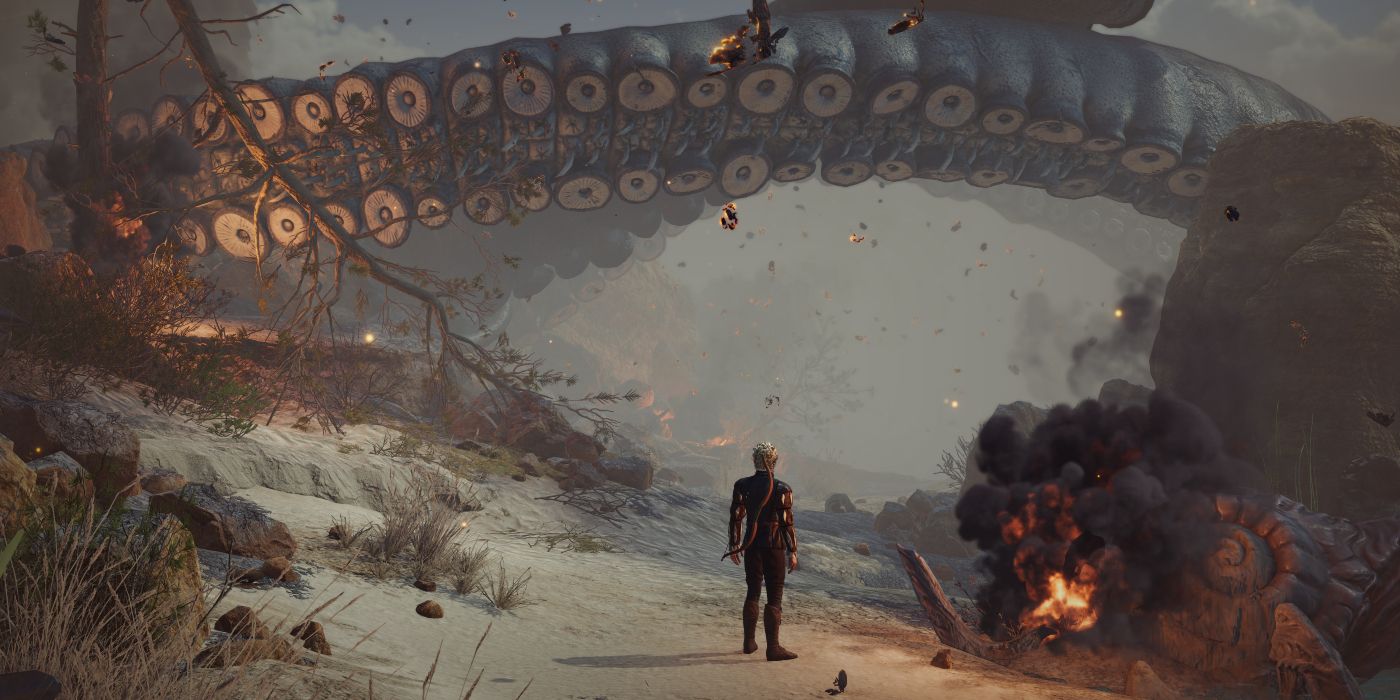To put it lightly, Baldur's Gate III has its sights set on being the ultimate Dungeons & Dragons RPG for all time. Even twenty years after the release of Baldur's Gate II, the brand continues to be held in high esteem, and its influence can still be felt all across the role-playing community. Now, developer Larian Studios, hot off the universal acclaim of Divinity: Original Sin II, are hard at work on making Baldur's Gate III the next great milestone for the genre.
While Baldur's Gate III had its big debut at PAX East, we were lucky enough to witness several hours of the game played by studio head Swen Vincke, which showcased how strongly BGIII adheres to the D&D ethos while building on the gameplay foundations established by Larian's work on Divinity: Original Sin.
After the demo, we had the chance to sit down with Combat Designer Matt Holland, who expounded upon some of what players can expect from the gameplay of Baldur's Gate III. The focus here is strongly on systemic interactions; creating a vast suite of variables that can be manipulated by players in order to solve puzzles, defeat enemies, and make their way through the world of Dungeons & Dragons. He explains why it's so important for D20 rolls to be a key part of the game, rather than being hidden in the background like in so many RPGs these days, and celebrates the continued relevance of hardcore RPGs.
Baldur's Gate III enters Early Access in 2020 and will release on PC and Google Stadia.
What was it like when the call came down that you were doing Baldur's Gate III? Were you aware of the talks taking place before it became official?
I wasn't really involved with the actual calls for it. We were just shipping Divinity: Original Sin II... Just a couple of weeks before we released, the whole company found out that we were going to be doing Baldur's Gate III. But even before then, apparently, there were some talks. I think Swen had approached Wizards of the Coast about it before. But I think it just all worked out. I think they really saw our vision for creating that tabletop experience, and Baldur's Gate is just a historic IP with a lot of history. It's a huge world to play in. It just all came together and here we are!
Was there ever any talk of not having the big die rolls visible? I love it, and just from seeing the demo, you clearly made the right choice, but was there ever any thought towards making the tabletop elements fade more into the background?
No. I think we always want to show the player as much as we can. We don't necessarily want to throw numbers at your fact, but we always want that to be there if you're looking for it. There's a combat log among all the UI elements that shows everything. It just makes it feel like, when you win, when you lose, when you pass a check, you always know why. It's a lot more satisfying.
It was great to sit in the room with everybody. Every time the die came up, a hush fell over the room. You could hear a pin drop until the die fell. And when Swen failed a die check of five, the room went nuts! It was great.
That's the thing about tabletop, as well. Just because you roll a three on a five die check, it doesn't mean it's game over. It just means you have something new to deal with. Players who want to go back and re-roll, that's fine, we allow players to use the save system to do that.
They're scrubs!
(Laughs) It's not about getting the highest roll. It's about, "this is my journey." This time, things didn't go too well for Swen, but it was still pretty funny! That's never happened.
Right, I feel like the demo we saw will go down in history. But that's all part of the adventure.
Everyone was laughing and having a good time.
We were all so psyched at the end, when he was trying to knock the boss into the spider pit, but absolutely nobody could have predicted that the boss would get knocked all the way over to the other side and then completely destroy the whole party? That was hilarious and awesome and magical. And it wasn't, like, "the demo went wrong." That's just how D&D works!
That's what makes the world so dynamic. You have all these various environmental elements that are constantly being tracked. So yeah, if you push someone, you have to make sure you're watching where their trajectory is. Otherwise, anything can happen.
Did you have anyone from the old team, the 1990s Baldur's Gate team? Was anyone from those days working on Baldur's Gate III?
Not as far as I'm aware. We do have a lot of people we talk to at Wizards of the Coast, who own the IP. We talk with them quite a bit. But as for the original team, I don't think so.
Baldur's Gate, and Baldur's Gate II, especially, they still hold up. Fun games to play! Espeially the Enhanced Editions. How do you set about improving that? Is it intimidating?
A lot has changed in the 20 years since Baldur's Gate II, just in terms of tech and the advancements of gaming, but also inside of the D&D ruleset itself. The original games ran on the Advanced D&D Ruleset, and now we're all the way up to the fifth edition. We want to work with the fifth edition ruleset, so going turn-based made more sense on that front. And our last two games used turn-based combat as well, so it made sense that way. It made sense for us to bring that into Baldur's Gate.
Did you always want to use the modern ruleset? Or was there ever a push to continue right where BGII left off?
Hmm, I don't know... I think it was always planned to use fifth edition. It's the most recent one, and the ruleset is easiest to get into. Obviously, we want the old, returning hardcore players to be able to sit down and enjoy this game. But we also want people new to D&D to still be able to get a really good experience. For a lot of people, it's a pretty daunting thing, if you're not used to pen and paper tabletop gaming. Having friends to do it with, or having the time to learn all the rules and books, we still want to be approachable for those people, as well.
Maybe the first big revelation during the presentation came when Swen moved the camera very close to the character, almost doing a full "over-the-shoulder" view. That was a good flex. Did you see that as an opportunity to make use of more dynamic camera movements during combat, make more use of three dimensional space?
Surveying the battlefield is very important. Every single battlefield has to be legible. It's very important, of course. Generally, in combat, you'll be more focused up, but if you want to get that more cinematic feel, we have that option for you. The game looks very good! The fidelity, compared to Divinity: Original Sin II, we've really brought it up quite a bit.
What are some of your favorite RPG combat systems over the years that may have inspired your work on Baldur's Gate?
That's a good question. For me, what's huge about working about Baldur's Gate, is... Baldur's Gate II: Shadows of Amn is one of my all-time favorite games in general. I remember playing that in junior high. Even though its combat system isn't very popular anymore, the real-time with pause, it's still a combat system I'll always be able to go back to and enjoy for myself.
That kind of led to KOTOR, right? I'm not as familiar with KOTOR, but it was kind of based on that BGII system, right?
Yes, and then Mass Effect after that, which went full action. I like playing various degrees of RPGs. I've played a lot of World of Warcraft. Especially the raid mechanics. I loved what they did with those systems. More recently, Dark Souls. I love that series. And Monster Hunter. What I really like to do is take these cool designs from other games in completely different genres and see, how can I convert that into a cool fight in our ruleset?
We've seen the industry move towards more action gameplay, with the RPG elements dialed back. We saw BioWare go from Baldur's Gate to Mass Effect and Anthem. Outside of that, Destiny and The Division, all great games (except for Anthem)... But recently, we're seen something of a renaissance thanks to Divinity: Original Sin, and now Baldur's Gate III, showing that there's still an appetite for old-school hardcore RPG mechanics that aren't simplified or hidden from the player. What's the secret, why does the CRPG keep coming back?
I think the first thing to look at is, what's a gamer? How many people in the world are playing games right now? There's a huge spectrum of players. You're going to have people... One of my best friends loves Destiny. There's a market for that game. I think there are many of us who love to have a game where you roll the die. We're still here. We still want to play these games. And there's a new generation who never knew they liked those games, and now they can jump in and play those games themselves. We see the resurgence in the market, and now it's just a matter of getting people to see that these cool games exist.
What are some of the enhancements and changes that have been made, from both Baldur's Gate II and Divinity: Original Sin II?
What we want to do when we create any encounter, be it a situation, quest, or combat, we want the player to look at that and think, "how can I solve this my way?" We want them to role-play, and figure out how to get an advantage in any situation. That's something we did in the Divinity: Original Sin games, and it's something we want to one-up, two-up, and three-up in Baldur's Gate III. We want you to be able to feel like you're talking to your DM and find the wackiest way to solve any problem you have. Dialogues are all very personal. So your options are based on who you are as a character. So the vampire Astarion has his own options compared to the wizard, Gale. It's all based on elements of race, background, and previous choices you've made in the game. For combat, we have a heavy emphasis on environmental interaction. So if you put grease on the ground, what happens if you put fire on that? Boom! Right? If there's water on the ground, and you zap it with electricity, the floor is electrified. Good luck standing in that. We carried that aspect over from Divinity: Original Sin II, and now we're adding mechanical environmental interactions. So, if you're standing on a rickety platform, I can find the support beam for that platform and break it so you fall down and take fall damage. And little things like being able to climb up get a height advantage. And having one character climbing atop the rafters to launch sneak attacks while the other characters are fighting the goblin king.
That felt very three dimensional. Three different levels of elevation, with one guy up high, the main battle down below, and then the spider pit below that.
Yeah. And you can get knocked in there as well, and start fighting against the goblin king and the spiders, who will fight everyone. It's limited only to our systemics. It's a very exciting thing, because what that means is that combat difficulty is limited to your own personal creativity, how you use the systems to your favor to take advantage of a situation.
I noticed, when enemies get killed, they have some ragdoll physics, and any ragdoll physics, that's my personal video game catnip.
It's fun to say, "ooh, we want this and that and the other thing," but you also have to have really good programming teams to accomodate all those crazy ideas. You can't just "put" physics on top of everything else. You need a really talented programming team to be behind you to support all this... Thankfully, we have some absolutely amazing programmers who are able to produce some real magic. Being able to shove somebody and have the arc be consistent with where you're pushing them and being able to adjust the arc so if you're standing here, you're going to fly in that direction so I can position you where I want you. But you need a very talented team behind you, and we're very lucky to have those guys who can do that.
Your team was very brave to show off the game at this pre-Early Access stage. But that's special. So many games get announced with, like, a logo and someone trying to command me to get excited over the prospect of, say, The Elder Scrolls VI or Starfield. I'm not going to get excited over a logo! I'm not gonna do it! But you showed us a live gameplay demo that had some crazy variables.
That's what we want. We want you to get a feel for the game. We don't want some pre-scripted smoke and mirrors. Whenever Swen plays, something always goes wrong, but that's D&D! Things always go wrong. It's less Lord of the Rings and more Monty Python. That's what we love. Coming from Divinity: Original Sin II, seeing players talk on forums, going, "I solved this quest this way," and, "Oh, I solved it this way!" It sparks people wanting to replay it so they can see how else they can approach these things.
There was also that one moment in the demo when Swen got one of his characters killed on the whole opposite side of the map from the rest of the party.
One of the "rules" of D&D is that you never split the party. There's only one DM, and they can only keep track of so many things at once. But what's really exciting is, in single player, or in multiplayer, we support up to four players, we can all go in different directions. We're limited only by what we can do as individuals. But sometimes, I'll make a mistake and get killed and have to tell you guys on Discord, like, "Hey, can you come help me?"
Okay, last question, and hear me out. Five dollar "loaded die" DLC.
(Laughs) No no no no no... I think the loaded die is save-scumming your way through a die check. We'll still allow you to do that if that's the way you want to play.
Baldur's Gate III enters Early Access in 2020 and will release on PC and Google Stadia.

